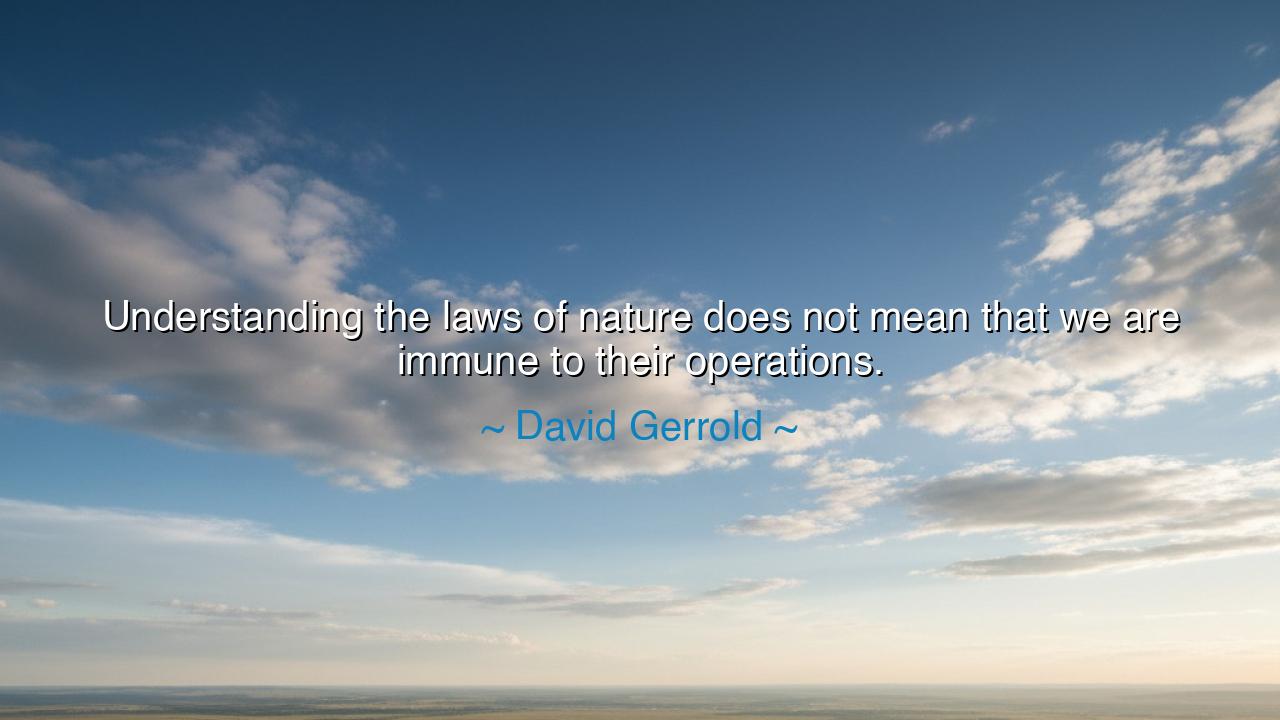
Understanding the laws of nature does not mean that we are






The sage David Gerrold once declared: “Understanding the laws of nature does not mean that we are immune to their operations.” His words strike like thunder across the mountains of thought, reminding us that knowledge, though bright as the sun, cannot shield us from the eternal cycles that govern all existence. To know the storm does not halt its rain. To know the sea does not calm its waves. The wisdom of men may illuminate the path, but it cannot erase the stones upon it.
In this teaching, we find humility. For often the learned man, puffed with pride, believes that mastery of knowledge is mastery of life itself. Yet the river carves its course regardless of the map, and the flame burns the hand regardless of the philosopher’s eloquence. Knowledge may warn us, guide us, and help us prepare — but the laws of nature bow to no mortal. We remain participants in the great design, never its sovereigns.
History itself testifies to this truth. Consider the story of the great ship Titanic, forged with the finest steel of its age, celebrated as “unsinkable.” The engineers who crafted it understood the forces of buoyancy, the strength of rivets, the mechanics of steam. Yet when the ship struck the iceberg in 1912, those laws of nature — cold, density, weight — did not bend to human ambition. Thousands perished, not because mankind did not understand the sea, but because understanding did not grant immunity. The operation of nature was merciless, exact, and absolute.
And so, the ancients would say: Beware the arrogance of the mind. For the farmer may understand the turning of seasons, yet he cannot command the rain. The healer may understand the humors of the body, yet he cannot decree eternal youth. Even today, we understand disease, yet we still feel its touch; we understand gravity, yet we still stumble; we understand mortality, yet we still must die. Knowledge is a lantern — it does not banish the night, but only helps us walk through it with steadier steps.
Yet do not mistake this truth as despair. The lesson is not that knowledge is powerless, but that it must be wed with reverence. The wise man prepares his roof though he cannot stop the storm. The sailor respects the sea though he has charted its tides. The physician serves with compassion though he cannot halt death. The power lies not in escaping the laws of nature, but in walking in harmony with them, humbly accepting both their gifts and their demands.
Thus, the quote of Gerrold is a call to balance. Let us pursue knowledge with fervor, for ignorance leaves us vulnerable. But let us also temper knowledge with humility, for pride makes us blind. Let the mind learn, but let the heart bow before the vastness of the cosmos. For in knowing we are not immune, we become wiser, gentler, more resilient.
What, then, must you do? First, honor the laws of nature. Rise with the sun, rest with the night, nourish the body, and respect its limits. Second, prepare with foresight. If you know the flood will come, build higher ground. If you know that fire burns, handle it with reverence. And third, walk humbly. Do not imagine yourself above the storm, but learn to stand firm within it. This is the way of strength: not to conquer the laws of life, but to live fully within them.
So let this teaching echo in your soul: understanding does not grant immunity, but it does grant wisdom. Use that wisdom not as a shield of arrogance, but as a compass of humility. In this way, you will not be broken when the winds rise, nor consumed when the fires blaze, but you will endure, as the oak endures — bending, but never falling, rooted in truth.






AAdministratorAdministrator
Welcome, honored guests. Please leave a comment, we will respond soon